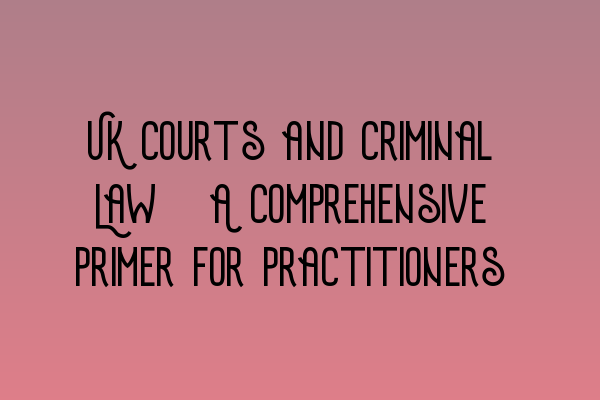UK Courts and Criminal Law: A Comprehensive Primer for Practitioners
Welcome to SQE Criminal Law & Practice Law UK, where we provide comprehensive information and guidance to aspiring practitioners in the field of criminal law. As a solicitor, it is crucial to have a deep understanding of the UK courts and criminal law system in order to effectively represent clients and navigate the legal landscape. In this article, we will provide a comprehensive primer on UK courts and criminal law, covering key concepts, procedures, and important considerations for practitioners.
Understanding the UK Courts System
The UK courts system is hierarchical and consists of several layers, each with their own jurisdiction and functions. At the top of the hierarchy is the Supreme Court, which is the highest court in the UK and deals primarily with legal issues of public importance. Below the Supreme Court are the appellate courts, namely the Court of Appeal and the High Court.
The Court of Appeal hears appeals from lower courts and plays a crucial role in shaping legal precedent. It is divided into two divisions: the Civil Division and the Criminal Division. The Civil Division handles non-criminal matters, while the Criminal Division deals with criminal appeals and reviews of sentences.
The High Court exercises both original and appellate jurisdiction. It is further divided into three divisions: the Queen’s Bench Division, the Chancery Division, and the Family Division. The Queen’s Bench Division deals with a wide range of civil and criminal matters, including high-profile criminal cases.
Beneath the High Court are the Crown Courts, which are responsible for handling serious criminal cases, including indictable offenses such as murder, rape, and drug trafficking. The Crown Courts also have jurisdiction over appeals from magistrates’ courts.
Magistrates’ courts are the entry point for most criminal cases in the UK. They deal with summary offenses, which are less serious offenses, and less severe cases. Magistrates are members of the local community who are appointed to preside over these courts, usually assisted by a legally qualified advisor.
Understanding the Criminal Law System
Now that we have a basic understanding of the UK courts system, it is essential to delve into the key principles and considerations of criminal law. Criminal law encompasses the rules and regulations that define criminal offenses, as well as the procedures and punishments associated with them.
In criminal law, offenses are categorized into two main types: indictable offenses, which are more serious and typically heard in Crown Courts, and summary offenses, which are less serious and are dealt with in magistrates’ courts. Indictable offenses include serious crimes such as murder, robbery, and drug trafficking, while summary offenses include minor offenses such as theft, traffic violations, and public order offenses.
When a person is accused of committing a criminal offense, they are entitled to certain fundamental rights and protections. These rights include the right to legal representation, the right to a fair trial, and the right to be presumed innocent until proven guilty. It is the role of the solicitor to ensure that these rights are protected and that the accused receives a fair trial.
The criminal law system also encompasses the concept of sentencing. Sentencing refers to the process of determining the appropriate punishment for a convicted offender. The court takes into consideration various factors, such as the seriousness of the offense, the offender’s criminal history, and any mitigating or aggravating circumstances. The aim of sentencing is to achieve a balance between punishment and rehabilitation.
Key Considerations for Criminal Law Practitioners
As a practitioner in the field of criminal law, there are several key considerations that you must keep in mind when representing clients and navigating the UK courts system.
First and foremost, it is essential to stay up to date with changes in legislation and legal precedent. Criminal law is a constantly evolving field, and it is crucial to be aware of any new statutes, case law, or amendments that may impact your clients’ cases.
Secondly, effective communication and negotiation skills are vital for criminal law practitioners. Building a strong rapport with clients, understanding their needs, and effectively advocating on their behalf is crucial for achieving successful outcomes. Additionally, the ability to negotiate plea bargains and secure favorable outcomes for clients is a valuable skill in criminal law practice.
Furthermore, thorough preparation and attention to detail are key to success in criminal law. Carefully reviewing case files, gathering evidence, and constructing persuasive arguments are essential for building a strong defense or presenting a compelling prosecution case.
Finally, ethical considerations play a crucial role in criminal law practice. Upholding professional standards, maintaining client confidentiality, and acting in the best interests of clients are fundamental principles that must guide your actions as a practitioner.
Conclusion
In conclusion, understanding the UK courts system and the key principles of criminal law is essential for practitioners in the field. From the hierarchical structure of the courts to the categorization of offenses, knowing the fundamentals of the criminal law system is crucial for effectively representing clients and achieving successful outcomes. By staying up to date with legal developments, honing communication and negotiation skills, and prioritizing thorough preparation, you can navigate the complexities of criminal law practice and make a positive impact in the lives of your clients.
For more information on related topics, please check out our articles:
- Demystifying the Solicitors Qualifying Examination Format
- LLC Formation Made Simple: Step-by-Step Guide for UK Entrepreneurs
- Business Regulations in the UK: A Comprehensive Overview
- Ethical Considerations in UK Law: Upholding Professional Standards
- Preparing for the SQE Exam: Strategies and Resources for Success
